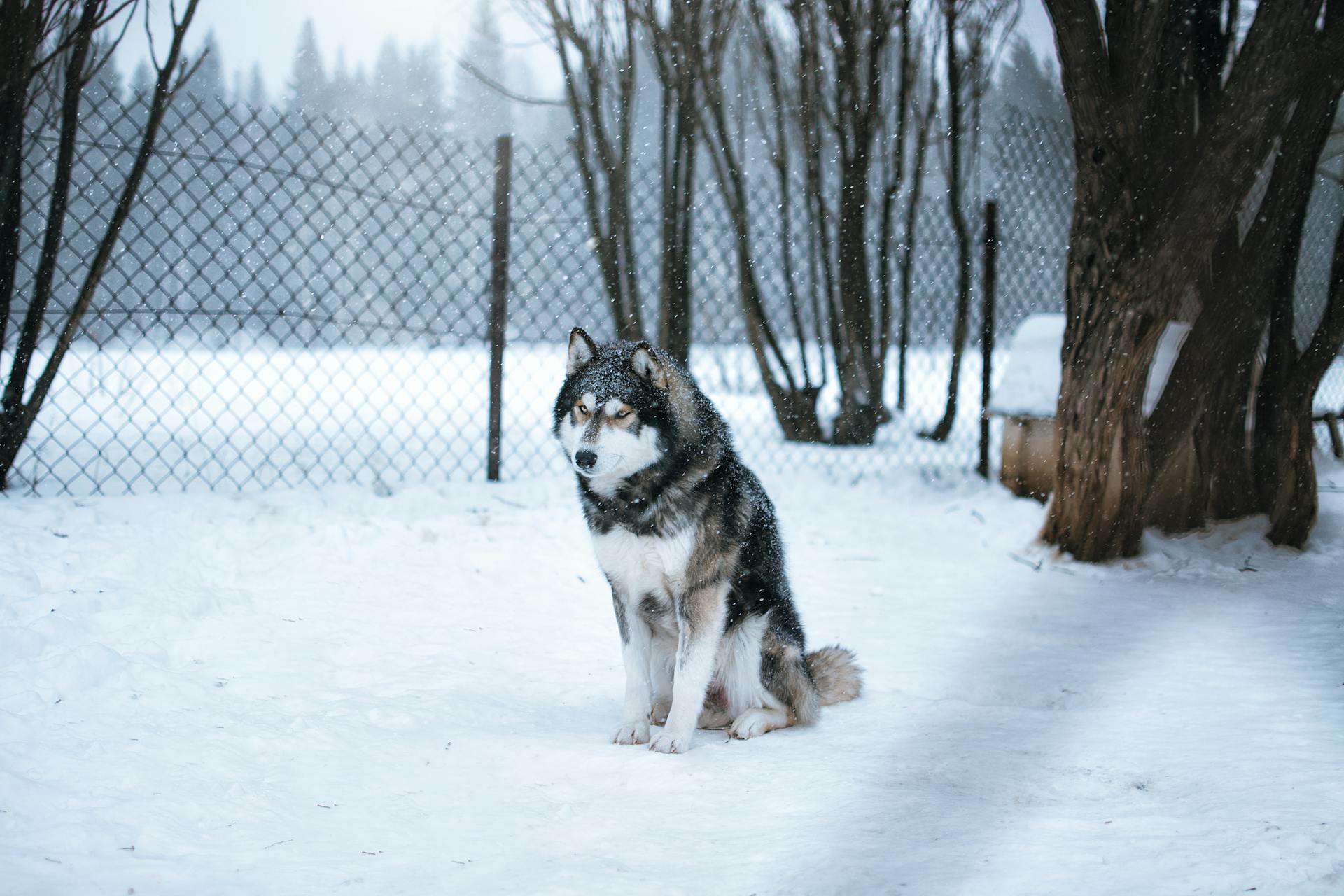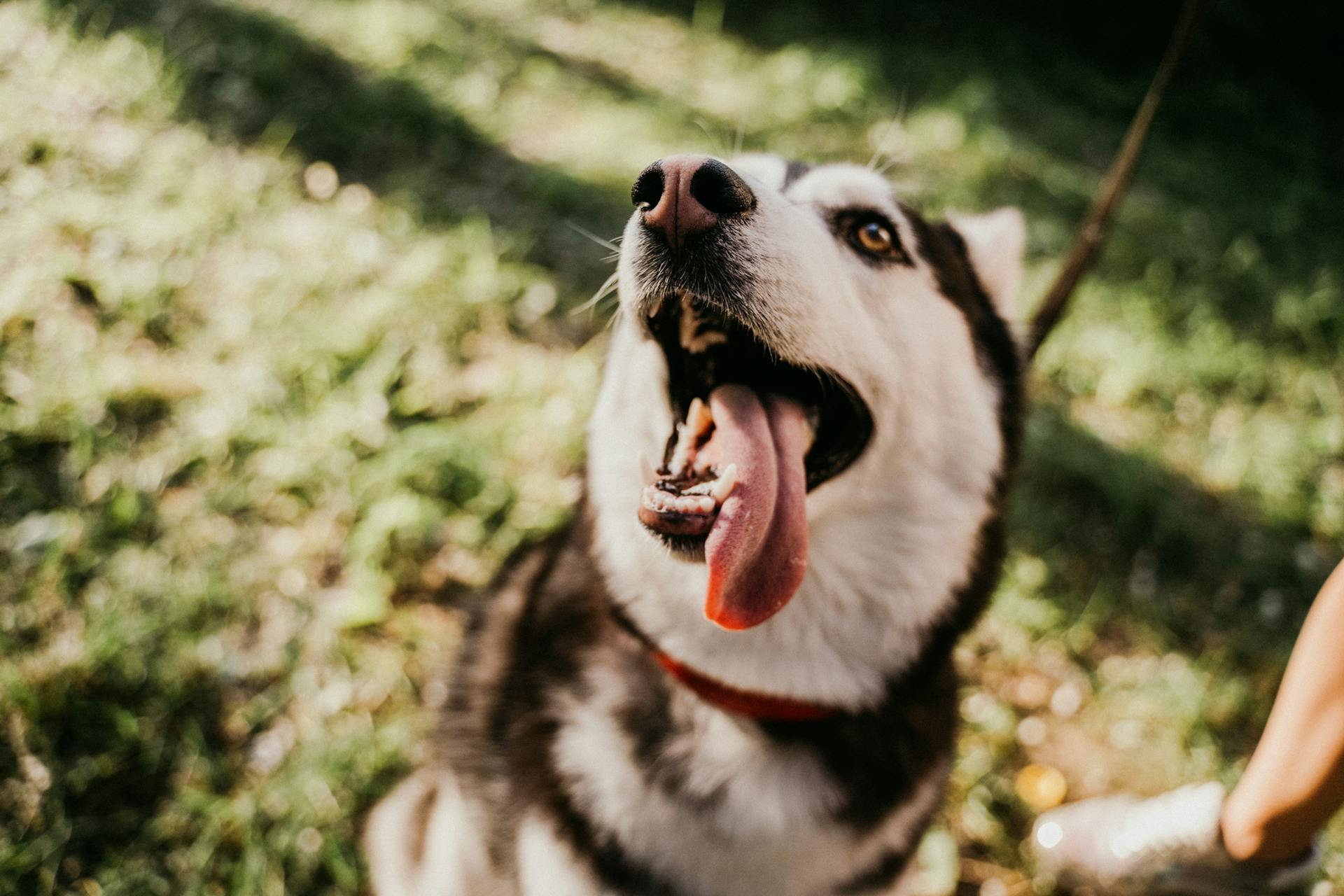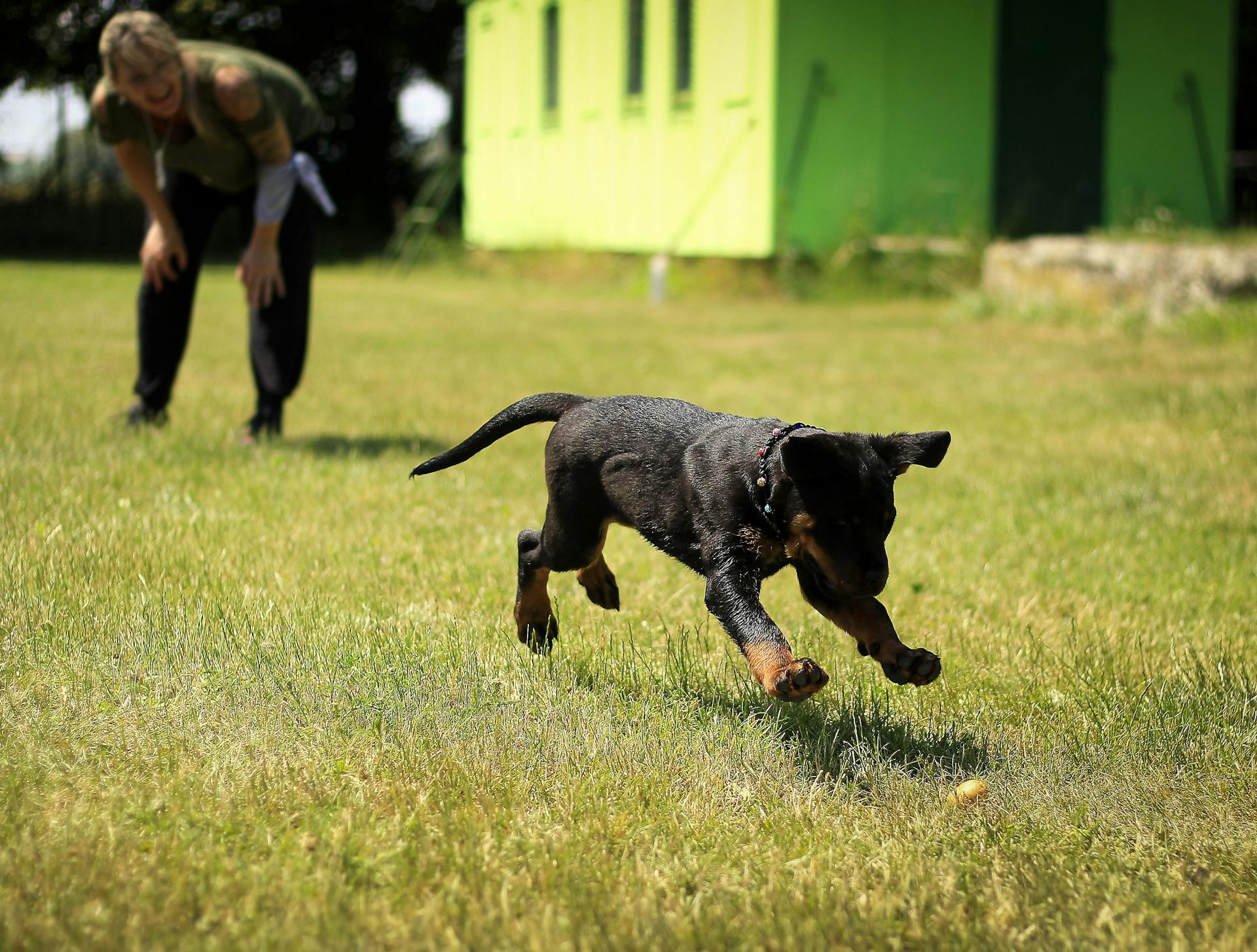
Huskies can indeed make excellent service dogs, but it's essential to consider their unique needs and characteristics.
Huskies are naturally intelligent and trainable, with a strong work ethic that makes them a great fit for service dog roles.
However, their high energy levels and strong prey drive require special attention and exercise.
Huskies require at least 1-2 hours of exercise per day, which can be challenging for some owners.
Husky Temperament and Suitability
Siberian Huskies are known for their affectionate nature and ability to form strong bonds with their family members.
Their friendly demeanor makes them a great fit for households with multiple pets, and they tend to get along well with children too.
However, Huskies can be stubborn and less eager to please their owners, which might make training a bit more challenging.
Their high energy levels require regular exercises and mentally stimulating games to keep them happy and healthy.
If you're an active person who enjoys outings, a Husky might be a great companion for you.
You might like: Great Dane
But, be prepared for a loud companion, as Huskies are known for their vocal nature, which includes howling, whining, moaning, and chirping.
Their independent streak and short attention span can make it difficult for them to focus on tasks, which might not be ideal for service dog work.
To maximize a Husky's learning time, you'll need to be devoted to training from a young age and establish clear expectations.
Despite their challenges, Huskies can make great family pets for active families who can provide them with the attention and exercise they need.
Consider reading: Do Service Dogs Have to Be Registered
Training and Tasks
Training a Husky as a service dog requires patience and understanding of their breed-specific traits. They can be trained to perform physically demanding tasks due to their strong physique.
To excel in tasks like providing balance support during walks or pulling a wheelchair, a Husky's temperament must be suitable for the job. Their ability to work as sled dogs is a significant advantage in this area.
Expand your knowledge: What Tasks Do Service Dogs Perform
A well-trained Husky can become an excellent medical alert service dog, notifying their owner of oncoming episodes such as anxiety, low or high heart rates, or blood sugar rates. Their long-muzzled head and natural alertness make them a good fit for this type of service dog work.
Their strong prey drive can be a challenge, but with proper training, a Husky can learn to remain focused on their owner and provide great support in navigating surroundings.
Trainability
Training a Husky as a service animal requires patience and discipline, as their trainability level is likely to be at a medium level. They can be stubborn and independent, making the process a bit challenging.
Huskies' strong prey drive is another aspect to consider, as it will require addressing this behavior if you want to train a canine of the breed as an assistance animal. Consistency and preparation for possible challenges are key.
By using the right approach based on your dog's needs and temperament, you may be able to turn a Husky into a great service animal.
For more insights, see: Service Miniature Horse
Mobility Tasks
Husky service dogs can be trained to perform physically demanding tasks due to their strong physique. They can provide balance support during walks and help their owner go up or downstairs.
Huskies can also be trained to pull a wheelchair, making them a great assistance animal for individuals with mobility issues. Their strength and endurance come in handy for tasks that require a lot of physical effort.
Providing balance support during walks is just one example of how a Husky service dog can assist their owner. They can also help with everyday tasks that might be challenging for someone with mobility issues.
With the right temperament and training, a Husky service dog can excel in mobility tasks. They can even retrieve items for their owner, making daily life a bit easier.
You might enjoy: Are Emotional Support Dogs Service Animals
Emotional Support and Psychiatric Tasks
Huskies can make great Emotional Support Animals (ESAs) because they provide companionship and comfort to their owners. With basic obedience training, they can be a loving and supportive companion.
To become a Psychiatric Service Dog (PSD), a Husky needs to learn specific tasks to help their owner deal with mental illnesses such as panic attacks, anxiety, and depression. This requires more intense training and exposure.
Training a Husky as a PSD can be challenging, especially for first-time dog owners, and may not be as easy as with other breeds.
Medical Alert Tasks
Huskies can excel as medical alert service dogs due to their physical features and natural alertness.
Their long-muzzled heads make them well-suited for this type of service dog work.
Their predisposition to barking is a valuable asset in alerting their owners to oncoming episodes.
To become effective medical alert service dogs, Huskies need to be trained to show a specific behavior in response to medical episodes.
You'll also need to motivate them to continue exhibiting this behavior over time.
Their natural alertness and tendency to bark make them a great fit for this type of service dog work.
If this caught your attention, see: Medical Alert Dog Training
Emotional Support and Psychiatric Dog Tasks
Training a Husky as a service dog can be a rewarding experience, but it's essential to consider their temperament and your own time and energy commitment.
Huskies can be trained to perform specific tasks as Emotional Support Animals (ESAs) or Psychiatric Service Dogs (PSDs).
To train your Husky as an ESA, you'll need to focus on basic obedience, as they'll provide companionship and comfort.
Deep Pressure Therapy and tactile stimulation are common tasks performed by PSDs, helping individuals manage mental health conditions like panic attacks, anxiety episodes, and depression.
Before training your Husky as a PSD, you'll need to invest time and energy into specific PSD training, ensuring they learn to work for you to cope with mental illnesses.
Remember, every dog has unique needs and limitations, so it's crucial to respect your Husky's boundaries and be loving and understanding of their requirements.
ESAs vs Dogs
Emotional support animals have less stringent requirements than service dogs. They don't need to be trained to perform a specific task to assist their owner.
Less intense training and exposure is required for ESAs compared to service dogs.
Pretty much all Huskies are more suitable to become ESAs than actual service dogs. This is especially true for first-time dog owners who might not have the time to invest into true service dog training.
Husky as Pets
Huskies are naturally social dogs that thrive on interaction with their human family and other dogs. They require regular exercise and mental stimulation to prevent boredom and destructive behavior.
Their high energy levels and strong prey drive make them a poor fit for homes with small pets or young children. They need space to run and play, and a securely fenced yard is essential.
Despite their independent nature, huskies are loyal and loving companions that bond strongly with their owners.
Why Huskies Make Good Dogs
Huskies are brilliant and hardworking, characteristics that lend themselves well to being great dogs. They are intelligent, confident, and calm under pressure.
Their independent nature, which was developed from working as sled dogs in the winter and roaming free in the summer, can also be a great asset. It means they are self-reliant and can think for themselves.
Huskies bond well with their people and make great companions. They just need a lot of attention and interaction to prevent understimulation.
With proper training and exercise, Huskies can thrive in a variety of living situations. They just need a lot of mental and physical stimulation to prevent boredom and inappropriate behaviors.
Huskies are known for their howls, whining, moaning, and chirping, but they don't bark as much as other breeds.
For more insights, see: Great Danes
Huskies as Pets
Huskies require a lot of exercise, ideally at least 1-2 hours per day.
Their thick coats shed heavily, so be prepared for regular grooming.
They are highly intelligent and trainable, but can be stubborn at times.
Huskies are social animals and do best with a family or another dog as a companion.
They have a strong prey drive and may not be suitable for homes with small pets.
Huskies are generally healthy, but can be prone to hip dysplasia and eye problems.
They live for an average of 12-15 years.
Huskies are naturally alert and may not be the best choice for a quiet neighborhood.
Worth a look: Best Dogs for Service Dogs
Reasons Against Huskies as Pets
Huskies are not a good choice for a service dog due to their strong instinct to run and be highly excitable. They were bred to run and pull sleds, not to stay by their owner's side.
Their ancestors were born to run, making it difficult for them to focus on their owner for long periods. This is not a sign of low intelligence, but rather a result of their original breed purpose.

Huskies often struggle to learn skills like ignoring distractions and not pulling on leash. This is a common challenge many Husky owners face, even in casual situations.
Trying to train a Husky as a service dog can be extremely difficult and may be futile. Even dogs bred for calm behavior can "flake out" during training.
You'll likely frustrate both yourself and your Husky by trying to turn them into a service dog. It's better to consider alternative roles for your Husky, such as an emotional support animal.
Frequently Asked Questions
Can a husky be a service dog for autism?
Huskies can be challenging to train as service dogs due to their independent nature, making them a less suitable choice for service dog work, including autism support. However, with proper training and experience, some Huskies may still be able to succeed in this role
Sources
- https://www.servicedogtrainingschool.org/blog/can-husky-be-service-dog
- https://spiritdogtraining.com/can-huskies-be-service-dogs/
- https://www.dogster.com/dog-training/do-huskies-make-good-service-dogs
- https://www.russiandog.net/can-a-siberian-husky-be-a-good-service-dog.html
- https://www.myhappyhusky.com/are-huskies-good-service-dogs/
Featured Images: pexels.com


